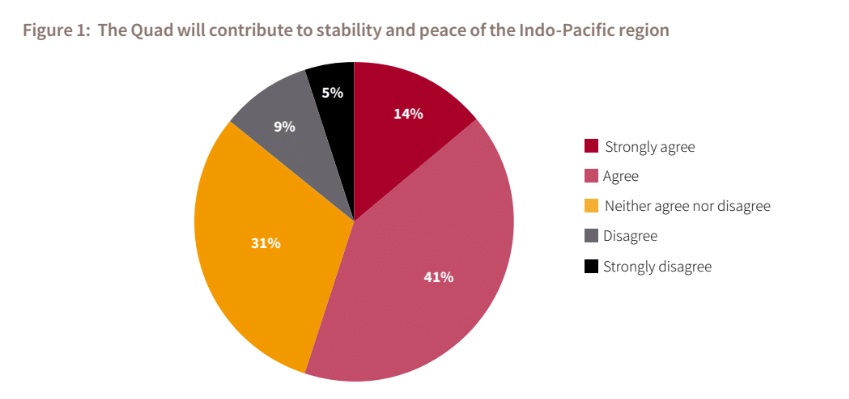
The debate about the Quadrilateral Security Dialogue revived as Quad 2.0 has been centred largely around perceived negatives: the harm it could cause rather than what it can really contribute to regional security. Those assumptions are based on perceptions (or, more correctly, misperceptions), whereby the Quad is seen as too confrontational towards China as well as challenging the centrality of ASEAN. These views have been so strong that much of the debate about the Quad has been about explaining what it is not, or not intended to be, rather than articulating what it is and understanding its broad objectives.
But my latest ASPI study—the first quantitative survey on the perceptions of the Quad in the Southeast Asian foreign and defence policy community—demonstrates that these negative views aren’t necessarily correct, nor are they the prevailing wisdom.

While some in Southeast Asia are more concerned about the Quad’s detrimental influence on the centrality of ASEAN, most survey respondents believe that the Quad actually complements the ASEAN-centred regional framework. The study found that Indonesians and Singaporeans are relatively more sceptical of the Quad than other ASEAN respondents, who were decisively more supportive of the initiative as a positive contribution to the region’s wellbeing.
A total of 44% of all ASEAN respondents saw the Quad as complementing the existing ASEAN security frameworks, while 21% thought it challenges ASEAN-led architecture. The biggest supporters of the Quad are those who value its potential role in maintaining security and stability—the Vietnamese and Filipino respondents.
A total of 36% of respondents saw the Quad as a necessary ‘anti-China bulwark’, while 21% believed that to view the Quad in that way is dangerous. Interestingly, none of the Vietnamese and Filipino respondents saw the ‘anti-China bulwark’ view of the Quad as a dangerous development, compared with 50% of Singaporean and 37% of Thai respondents who thought the Quad could foster a potentially confrontational atmosphere in the region.
Survey respondents saw value in the Quad members’ engagement in regional security even if that risks being viewed as confrontational towards China. A decisive majority (69%) of respondents expressed the hope that the Quad can contribute to enforcing the rules-based order, particularly in relation to territorial and maritime disputes. These findings contradict the popular commentary that the Quad should restrict its activities to non-controversial tasks, such as humanitarian assistance and disaster relief. Southeast Asians clearly prefer a mechanism that would help preserve adherence to the rules-based order and international law.
The survey of Southeast Asian attitudes points to some key challenges for the evolution of the Quad. The lack of clarity about long-term objectives among Quad members themselves presents as the biggest concern for the formation’s future. A total of 48% of respondents expressed concern that the interests of Quad members are too divergent and their mission is unclear. Provoking China was a secondary consideration.
On the question of whether the Quad should be expanded, 68% of respondents thought it was a bad idea as it could undermine the need to establish a convergence of interests and objectives. Some of the respondents elaborated, saying that they think that the Quad should avoid becoming ‘another ASEAN’.
Based on these findings, Quad members and their regional partners—including ASEAN states—should focus more on exploring beneficial forms of cooperation. As a first step, the Quad nations need to agree on a set of common objectives and actionable goals. They need to recognise that while there is a considerable appetite for a successful Quad, there will be little continued enthusiasm if the Quad fails (again).
Given that most ASEAN respondents think that the Quad actually complements the existing regional architecture, the report recommends that ASEAN leaders explore channels for cooperation and coordination, particularly in the areas where there is broad consensus. After all, Southeast Asia as a whole needs to make more of an effort to sustain peace, stability and prosperity—not less. Quad members, in turn, should recognise the centrality of ASEAN’s role and not seek to create another ASEAN-like institution in the region.
To read the full report’s analysis and recommendations, click here.

